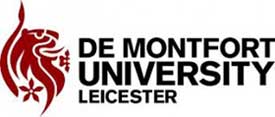About English Language BA (hons) in De Montfort University
We live in a world governed and connected by technology. At DMU we believe that you should study the nature of the 'wired' environment and how it influences who you are. As part of our approach to digital humanities, you will have the opportunity to see how communication and language operate on web-based platforms, and how the application of digital tools and methods can deepen the knowledge of your chosen subject area.
Your first year will introduce you to the study of language in general, how sounds become words and how words are put together to create meaning. You will develop your ability to take language apart as well as learn how to put it together to create clear, effective communication.
Second and third year options include teaching English, a final-year work placement module and the opportunity to study material such as propaganda and interrogation, pragmatics – which looks at the gap between what we say and what we mean – psycholinguistics, and the political, social and cultural roles of language.
The language you speak shapes the world you see. This degree helps you understand both better, and to make connections between what you study and what goes on in the world beyond the classroom.
Key features:
-
You will study a range of topics, including words in action, a foreign language, sociolinguistics, corpus linguistics and TESOL.
-
Develop a global understanding of the English language through our international experience programme, DMU Global. Students have previously explored ekphrastic writing and themes of oppression in Berlin, and visited TED HQ and key literary locations in New York.
- 100% of our graduates from summer 2017 are in work or further study, according to the Destinations of Leavers from Higher Education 2016-17 report.
-
Evolve a range of transferrable skills that are valuable to a variety of career paths. Our graduates have gone on to work at Meisei University in Tokyo, the Department of Transport, communications agencies and schools in the UK and overseas.
-
Visiting lecturers have included world-renowned expert of forensic linguistics Dr John Olsson, while organised trips to professional events have seen students visit the London Language Show.
-
Gain workplace abilities and experience by putting your research, reasoning and communication skills into practice on a placement or extracurricular internship during your degree.
Typical entry requirements
- 104 points from at least 2 A'levels
- BTEC Extended Diploma DMM
- International Baccalaureate: 24+ Points
GCSEs - Five GCSEs at grade A*-C including English Language or Literature at grade C or above or equivalent.
Access - Pass QAA Accredited AHE Diploma with at least 15 credits in Creative Writing, English Language or Literature at grade Merit and GCSE English (Language or Literature) at grade C or equivalent.
We also accept the BTEC First Diploma plus two GCSEs including English at grade C or above or equivalent.
International students
If English is not your first language an IELTS score of 6.0 overall with 5.5 in each band, or equivalent when you start the course is essential. English Language tuition, delivered by our British Council accredited Centre for English Language Learning, is available both before and throughout the course if you need it.
De Montfort University Highlights
| Type of Institution |
Public |
| Campus Setting |
Urban |
| Endowment |
£1.17 million |
| Number of Campuses |
4 faculties |
| Number/Percentage of International Students |
23205 |
| Total number of Professors |
3240 |
| Student Satisfaction Rate |
86% |
| Graduate Job Rate |
97.3% |
| Number of Residence Vacancy |
Around 3000 |
| International fee |
Undergraduates- £13240 (annual) Postgraduates- £15950 (annual) |
| Number of Academic Programs |
UG, PG, Part time, distance, blended |
| Mode of Program |
Full time, distance and online |
| Average Graduate Salary |
19800 pounds a year |
De Montfort University The tuition fee (In GBP) for various programs is tabulated below:De Montfort University Average Cost
| Field of Study |
Avg.Fees |
| Art, Design and Humanities: |
£13,750 |
| Business and Law |
£13,750-£14,550 |
| Media |
£13,750 - £14,250 |
| Engineering |
£14,250 |
| Computing |
£14,250 |
| Health and Life Sciences |
£13,250 - £14,250 |
| Nursing BSc |
£14,950 |
De Montfort University The Average Tuition Fees and Other Expenses
| Expenses |
Estimated cost in pounds |
| Undergraduate tuition fee |
13,250- 14950 |
| Postgraduate tuition fee |
13600-15,900 |
| On campus accommodation |
5,000-6040 |
| Average cost of living |
97-110 per week |
DMU International Scholarship up to 1500 pounds
- TEF Gold Outstanding Alumni Scholarship up to 3000 pounds
- Leicester Castle Business School Scholarships:
- Global MBA Scholarship £3,000 - £5,000
- Full Postgraduate Scholarship
- LGBTQ + Allies Scholarship-two fully funded post graduate taught scholarship packages including full fee weaver and maintenance bursary.
- Vice Chancellor's Sports Scholarship- three different scholarship packages are available with eligible students being awarded up to 6000 pounds of support.
